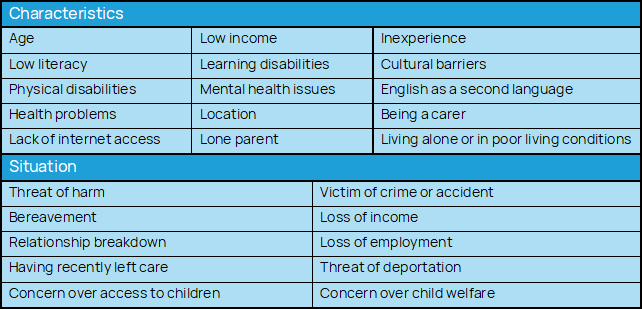Risk Alert! Meeting the needs of vulnerable clients
Published
Read time
What does your firm do to ensure that you identify and meet the needs of vulnerable clients? Given the current challenges that many individuals will be facing in the fallout of the pandemic, this is an appropriate time for firms to consider this question.
If vulnerable clients are not identified and advised in a way that meets their needs, there can be damaging consequences for both the client and the firm. From the client’s perspective, the experience could increase their vulnerability, impact their wellbeing and result in financial loss. The outcome for the firm could include a professional negligence claim, a complaint to the Legal Ombudsman or SRA, disciplinary action, a claim under the Equality Act 2010 and reputational damage. Needless to say, your PII insurer would be wanting to know why and how this happened.
What is your responsibility?
The starting point is the duty under 3.1 of the Code of Conduct for Solicitors to “consider and take account of your client's attributes, needs and circumstances”. This requirement is also repeated in clause 4.2 of the Code of Conduct for Firms. Firms must ensure that fee earners have the skills to identify vulnerable clients and take such steps as are necessary to ensure their needs are addressed.
“Vulnerability” comes in all sorts of guises and can impact many practice areas. A vulnerable client could be buying, selling or mortgaging a property, completing a will, settling a personal injury claim, or needing advice following a marriage or relationship breakdown. Training should therefore be addressed widely across the practice groups within your firm.
Identifying vulnerable clients
Identifying whether a client is in fact vulnerable can be difficult. While one client who is, for example, going through a particularly stressful time, may be considered to be vulnerable, another client going through a very similar experience may not be. Vulnerability is subjective, but to comply with the obligations under the Code of Conduct, solicitors need to take an objective view.
Consideration needs to be given to a broad range of circumstances when considering if a client is vulnerable. The following list of characteristics and situations published by the Legal Services Consumer Panel provide a good starting point for identifying scenarios where the issue of vulnerability might arise:[1]

[1] Recognising and responding to consumer vulnerability: a guide for legal services regulators, Legal Services Consumer Panel, 2016
16.4% of adults in England, or 7.1 million people, can be described as having 'very poor literacy skills.' They can understand short straightforward texts on familiar topics accurately and independently, and obtain information from everyday sources, but reading information from unfamiliar sources, or on unfamiliar topics, could cause problems. This is also known as being functionally illiterate.” (National Literacy Trust)
Modifying your services
Being a vulnerable client does not necessarily mean that the individual is incapable of giving instructions or making legal decisions – in most cases it will mean that they need additional support and assistance to do so. It is therefore important to consider what you need to put in place to ensure your client’s needs are met.
Once again it is useful to engage in dialogue with the client, or if appropriate, their carer, family or support person, to identify what they need to engage in the process, consider and understand the advice and take decisions. Solutions will depend on the nature and extent of the vulnerability in each case, but here is a list of more general points that your firm might want to review and consider implementing as a starting point:
- Invite clients to raise any vulnerability issues with you – note this on your website, marketing materials and with a notice in your reception area.
- Redraft terms of business, client care letters and information on issues such as costs and legal processes to provide an 'easy read' version for clients whose first language is not English or who have poor literacy skills. Alternatively arrange for these documents to be translated.
- Identify specialist support that can be engaged locally when required. For example professional language interpreters, British sign language interpreters, client advocates.
- Offer flexibility regarding the appointment time and venue. In some cases it might be more appropriate to meet a client in their own home. Length of appointments can also be an issue. Some clients might cope better with shorter appointments, in which case more appointment times will be needed.
- Review your office to determine whether any issues regarding accessibility need to be addressed.
- Review staff training. In addition to ensuring that all fee earners undertake training regarding vulnerable clients, it is also important to provide appropriate training to reception and support staff. They will also be interacting with vulnerable clients and will generally be the first point of contact for phone calls and office appointments.
- Ensure there is adequate support and supervision within your firm. Identifying and addressing the needs of vulnerable clients is not straightforward and an open door policy to discuss concerns and strategies will assist to manage the challenges and risks involved.
Training and Guidance
Both the Law Society and SRA websites have the following useful guidance that firms can use as a helpful starting point for training purposes:
- Meeting the needs of vulnerable clients (5 June 2020)
- Working with vulnerable clients – Case Studies (5 June 2020)
- Working with clients who may lack mental capacity (5 June 2020)
- Financial abuse (14 July 2020)
- Close to home: Spotting elder abuse (9 March 2020)
- Law under lockdown: the impact of COVID-19 measures on access to justice and vulnerable people (25 September 2020)
- Providing services to deaf and hard of hearing people (July 2012)
- Reasonable adjustments in the provision of legal services (10 October 2019)
- Providing services to people who are vulnerable (9 March 2016)
Ten Practice Points
- Be alert, listen and observe. Look out for signs that a client is vulnerable.
- If you suspect your client is vulnerable, take time and ask more questions so you can take a properly informed view.
- Be alert to vulnerability becoming an issue during the course of a retainer.
- If you suspect undue influence, arrange to see your client alone. Claims of undue influence often lead to professional negligence claims – beware.
- If you are considering using a disclaimer, think about whether it will be effective. Depending on the circumstances you may be better ceasing to act.
- Ensure you record any concerns you may have regarding your client’s vulnerability and that you address those concerns and modify your services to meet their needs.
- Discuss difficult cases or any uncertainty you have with your supervisor or an experienced colleague in your firm. For some issues you might also wish to refer to the Law Society Practice Advice Service Telephone: 020 7320 5675 or the SRA Professional Ethics Helpline Telephone: 0370 606 2577.
- Don’t assume your client understands what you are telling them or your written advice simply because he or she does not question you. Ensure there is an opportunity to clarify matters with you.
- Use plain English and explain issues without using legal jargon.
- Your overriding duty is to your client and you must ensure that your instructions are from your client.

Written by Jenny Screech LLB (Hons)
Legal Consultant, Howden PII